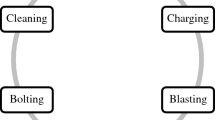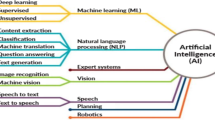Abstract
In this paper, we propose a new dispatching rule and a set of local search algorithms based on the filtered beam search, GRASP and simulated annealing methodologies to construct short-term observation schedules of space mission projects, mainly for NASA's Hubble Space Telescope (HST). The main features of generating short-term observations of HST are state dependent set up times, user specified deadlines, visibility windows of the targets and the priorities assigned to the observations. The objective of HST scheduling is to maximize the scientific return. We have tested the relative performances of the proposed algorithms including the nearest neighbor rule both in objective function value and computational time aspects by utilizing a full-factorial experimental design.
Similar content being viewed by others
References
Collins, N., Eglese, R. and Golden, B. (1988) Simulated annealing-an annotated bibliography. American Journal of Mathematics and Management Science, 8, 209–308.
Connoly, D. T. (1990) An improved annealing scheme for QAP. European Journal of Operational Research, 46, 93–100.
Desrochers, M., Lenstra, J. and Savelsbergh, M. (1990) A classification scheme for vehicle routing and scheduling problems. European Journal of Operational Research, 46, 322–332.
Desrosiers, J., Dumas, Y., Solomon, M. M. and Soumis, F. (1994) Time constrained routing and scheduling, TechnicalReport G-92-42, GERAD, McGill University.
Feo, T. A. and Resende, G. (1995) Greedy randomized adaptive search procedure. Journal of Global Optimization, 6, 109–133.
Feo, T. A., Sarathy, K. and McGahan, J. (1996) A GRASP for single machine scheduling with sequence dependent setup costs and linear delay penalties. Computers & Operations Research, 23, 881–895.
Fisher, M. and Jaikumar, R. (1978) An algorithm for the space shuttle problem. Operations Research, 26, 166–182.
Hall, N. G. and Magazine, M. J. (1994) Maximizing the value of a space mission. European Journal of Operational Research 78, 224–241.
Hochbaum, D. S. and Landy, D. (1994) Scheduling with batching: Minimizing the weighted number of tardy jobs. Operations Research Letters, 16, 79–86.
Johnson, D. S., Aragon, C. R., McGeoch, L. A. and Schevon, wC. (1989) Optimization by simulated annealing: An experimental evaluation; Part 1, graph partitioning. Operations Research, 37, 865–892.
Johnston, M. D. (1987) HST Planning Constraints, SPIKE Technical Report 87-1, STScI, Johns Hopkins University, Baltimore, MD.
Johnston, M. D. and Adorf, H. (1992) Scheduling with neural networks-the case of the Hubble Space Telescope. Computers & Operations Research, 19, 209–240.
Kirkpatrick, S., Gelatt, C. and Vecchi, M. (1983) Optimization by simulated annealing. Science, 220, 671–680.
Lann, A. and Mosheiov, G. (1996) Single machine scheduling to minimize number of early and tardy jobs. Computers & Operations Research, 23, 679–681.
Laporte, G. (1992) The vehicle routing problem: An overview of exact and approximate algorithms. European Journal of Operational Research, 59, 345–358.
Lowerre, B. (1976) The HARPY speech recognition system, Ph.D. Thesis, Carnegie Mellon University, PA.
Minton, S., Johnston, M. D., Philiphs, A. B. and Laird, P. (1992) Minimizing conflicts: A heuristic repair method for constraint satisfaction and scheduling problems. Artificial Intelligence, 58, 161–205.
Moore, J. (1968) An n job one machine sequencing algorithm for minimizing the number of late jobs. Management Science, 15, 102–109.
Morton, T. E. and Pentico, D. W. (1993) Heuristic Scheduling Systems: With Applications to Production Systems and Project Management, John Wiley & Sons.
Muscettola, N., Smith, S. F., Cesta, A. and D'Aloisi, D. (1992) Coordinating space telescope operations in an integrated planning and scheduling architecture. IEEE Control Systems, 12, 28–37.
Ow, P. S. and Morton, T. E. (1988) Filtered beam search in scheduling. International Journal of Production Research, 26, 35–62.
Potts, C. and Wassenhove, L. V. (1988) Algorithm for scheduling a single machine to minimize the weighted number of late jobs. Management Science, 34, 843–858.
Sabuncuoglu, I. and Karabuk, S. (1998) A beam searchbased algorithm and evaluation of scheduling approaches for flexible manufacturing systems. IIE Transactions, 30, 179–191.
Smith, S. F. and Pathak, D. K. (1991) Balancing antagonistic time and resource utilization constraints in oversubscribed scheduling problems. Technical Report CMU-RI-TR-91-05, The Robotics Institute, Carnegie Mellon University, PA.
STScI (1986) Proposal Instructions for the Hubble Space Telescope, Technical Report, STScI, Johns Hopkins University, Baltimore, MD.
Waldrop, M. (1989) Will the Hubble Space Telescope Compute? Science, 243, 1437–1439.
Zegordi, S. H., Itah, K. and Enkawa, T. (1995) Minimizing makespan for flow-shop scheduling by combining simulated annealing with sequence knowledge. European Journal of Operational Research, 85, 515–531.
Author information
Authors and Affiliations
Rights and permissions
About this article
Cite this article
Akturk, M.S., KiliÇ, K. Generating short-term observation schedules for space mission projects. Journal of Intelligent Manufacturing 10, 387–404 (1999). https://doi.org/10.1023/A:1008966929487
Issue Date:
DOI: https://doi.org/10.1023/A:1008966929487




